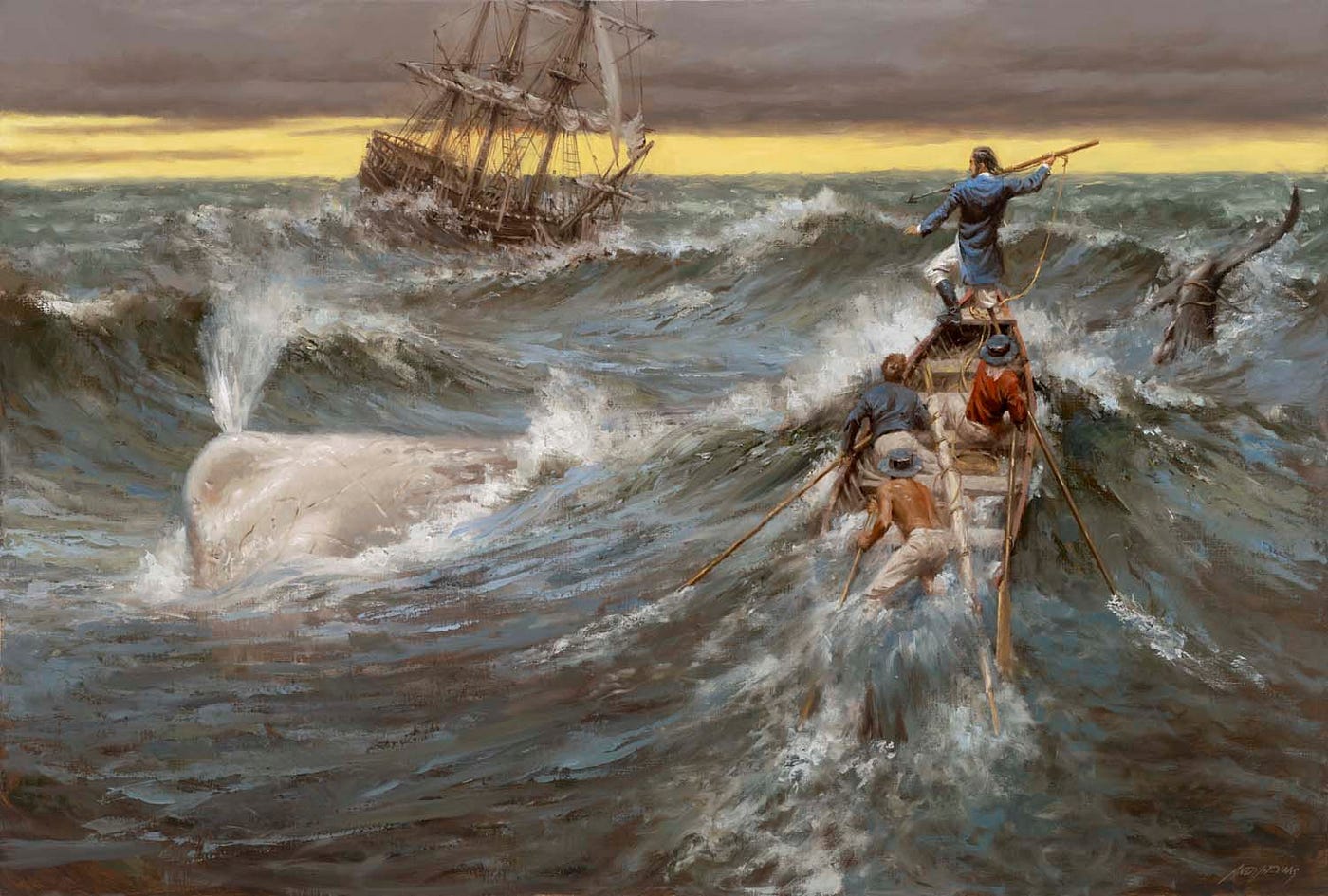The Sea Mammal Theory of Writing
Fish out of water... and then back in again.
For my birthday, my girlfriend surprised me with whale watching.
We got on a skiff and sat on horse-like seats with shock absorbers. In front of us was a Russian couple, Instagram lips and Louis Vuitton, and way behind us was an older Midwestern couple, sunscreen and New Balance with high socks. The rest of the seats were empty.
The friendly tour guide chatted with us over a loudspeaker as we puttered out of the harbor. Then, we dashed to the deep ocean, riding the waves like a mechanical bull. Garbled radio chatter and GPS guided our way. We turned, heading toward splashes on the horizon. Quickly, we joined a pod of common dolphins, at least 150, stampede—what it’s called when they rush in one direction, breaching in alternating streams of slick bodies.
I hooked my arm on the rope and hung over the inflated port side, getting my face a few short feet from underwater mammal tubes. As I marveled, factoids rolled over the loudspeaker: their milk is high in fat so it can be sucked out of the surrounding water by the babies, born the size of footballs.
I was most surprised to learn that dolphins can only hold their breath for, at most, 10 minutes. Not more than a human can—so, it’s comfortable for them to come up every minute or so. Imagine having to hold your breath your entire life. Why do mammals even live in the ocean?
Then came reports of a sperm whale. We rushed to the last reported sighting like part-time Ahabs, after the White Whale. We found only open, quiet ocean. I had heard that whale watching is mostly water watching.
Still, I was thrilled to be floating above primordial chaos. I spend so much time in a hall of mirrors—cinematic danger, imagined chaos, and virtual mystery. To experience some unknowable depths firsthand felt like shattering the mirrors for a short moment. Things felt pleasantly real again. I reached my mind's eye to the dark below my feet—the unmitigated mystery—and realized that there are creatures down there older than humanity and without names.
Then, I thought about how this boat tour was devoted entirely to mammals. Dolphins, whales, and sea lions. Another factoid: there are millions of dolphins swimming around Southern California. Somehow, these air-breathers took over.
Millions of years ago, fish somehow evolved to live out of the water, into reptiles, amphibians, and eventually small mammals. Then, into larger mammals, a subsection who evolved to live on the coastline, and then some of those evolved to live entirely back in the ocean. What a strange strategy.
Dolphins, with their mammalian brains and social networks, are able to outthink the sharks, who are perfectly sculpted predators of the primordial deep. Dolphins, almost with a big smile, playfully dominate the eternal water dragon.
Most writers aspire to be sharks. Purists of the craft and followers of the muse alone. They want to devour enough other fish to become the ultimate killing machine—top of the food chain, perfectly designed for predation.
Others escape the sea altogether. These sorts, I guess, are like the ghostwriters and copywriters. have a higher vantage point and there is more oxygen. But life is harder outside of the waters of abundance and inspiration. Food is limited and it takes more energy to move around without the buoyancy of the deep.
Then, there's these freaks—the sea mammals. Those who became strangers in a strange land, adapted, went entirely native, and then came back home to the water, having mastered both worlds. It's a mode of being neither a shark nor a sheep could ever understand.
Creatures like the blue whale, for example, are the largest creatures that have ever been on Earth (bigger than dinosaurs, even). Their hearts alone are as big as elephants—the land's largest creatures. They get the best of both worlds: mammalian lungs that take in oxygen from the air, but their massive bodies are supported by the buoyancy of the water. They feast on the unmitigated abundance of the dumb primal sea to grow bigger than possible.
Finally, a metaphor for writers:
Don’t try to be a shark—which would be to try to master the domain of writing alone. Don’t be a sheep, which goes to land to feed on the paltry but predictable grass of corporate work.
I don’t know—become a handyman, an adman, or a fireman. Then, once you've reached a point where you could comfortably stay on that dry land, go back to the water.
Re-adapt, just once more. It’s painful: now you have lungs that don’t breathe water and a sensitive mammal brain that fears the depths.
But if you survive the transitions, you will, finally, have free rein to feast in the primal deep.



What you described is why I call my Substack Polymathic Being. Jack of all trades and master of none but most often better than a master of one.
It gives me the freedom to explore and grow.
https://www.polymathicbeing.com/p/embracing-my-white-belt
Relevant whale fact I learned recently: Whales only sleep with one hemisphere of their brain at a time because they need to be conscious enough to come up to the surface to breathe.